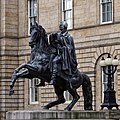John Steell

Sir John Robert Steell RSA (Aberdeen 18 September 1804 – 15 September 1891) was a Scottish sculptor.[1] He is best known for a number of sculptures displayed in Edinburgh, including the statue of Sir Walter Scott in the Scott Monument.
Biography
Steell was born in Aberdeen, but his family moved to Edinburgh around one year after his birth.[2] He was one of the eleven children of John Steell senior, an Edinburgh carver and guilder, and Margaret Gourlay, the daughter of William Gourlay, a Dundee shipbuilder. Steell initially followed his father, training to be a carver himself. He showed artistic talent, and so studied art at the Trustees Academy in Edinburgh and then studied sculpture in Rome. On his return he was commissioned for numerous works, particularly statues and monuments in Edinburgh. The first work to attract major attention was Alexander taming Bucephalus carved in 1832–33 (cast in bronze in 1883, and now standing in the quadrangle of Edinburgh City Chambers). Around 1838 he was appointed as Sculptor to Her Majesty the Queen, a post which was later recognised as part of the Royal Household in Scotland.[3] In 1840 he opened Scotland's first foundry dedicated to sculpture, in order to cast his statue of Wellington himself.[4] He exhibited at the Royal Scottish Academy and the Royal Academy, and was knighted in 1876 following the unveiling, by Queen Victoria, of his statue The Prince Consort, which stands in Charlotte Square in Edinburgh.
Sir John Steell's brother Gourlay Steell was himself a noted animal painter: he was Queen Victoria's animal painter, taking over from Sir Edwin Landseer. Many of Gourlay Steell's paintings remain in the private collection of Queen Elizabeth II. His portrait was painted by Robert Scott Lauder and William Grant Stevenson (Aberdeen Art Gallery).
Steell died on 15 September 1891 and is buried in an unmarked grave in Edinburgh's Old Calton Cemetery. This grave was purchased by his father John Steell senior and many members of the Steell and Gourlay families are also interred there.
Works
Steell's works include:
- a wooden statue of St Andrew in the Dalkeith Kilwinning No. X masonic lodge, Dalkeith.
- a bust of Wardlaw Ramsay in the Scottish Missionary Society Hall, Edinburgh, 1838
- the statue of Sir Walter Scott sitting with his dog Maida under the Scott Monument, carved 1840–46 from a single 30 ton block of Carrara marble.
- a stone statue of Queen Victoria on top of the Royal Scottish Academy (originally called Edinburgh's Royal Institution), 1844.
- a bust of the Duke of Wellington at Eton College, 1845.
- a bust of the Duke of Wellington at Apsley House, 1846.
- pediment of the Head Office of the Bank of Montreal in Montreal, 1847.
- a statue of artist Allan Ramsay at the foot of The Mound in Edinburgh, 1850.
- a bronze equestrian statue of the Duke of Wellington outside Register House in Edinburgh, 1852. When it was unveiled the press dubbed the statue "the Iron Duke in bronze by Steell".
- the gravestone of Professor John Wilson in Dean Cemetery in Edinburgh, 1854.
- a statue of Professor John Wilson in Princes Street Gardens, Edinburgh, 1856.
- a statue of Lord Melville the centrepiece of Melville Street in Edinburgh, 1857.
- a bust of Lord Cockburn standing in Parliament House, Edinburgh, 1857.
- a statue of Lord Jeffrey also in Parliament House, 1857.
- a bust of Sir John McNeill, Scottish National Portrait Gallery, Edinburgh, 1859.
- a bronze bust of Florence Nightingale, on display at Derby Museum and Art Gallery, Derby, 1862.[5]
- a monument to the Duke of Atholl at Blair Atholl, Perth, 1864.
- a statue of Lord Dalhousie in Calcutta, 1864.
- a monument to soldiers from the 93rd Sutherland Highlanders regiment who fell in the Crimean War, situated in Glasgow Cathedral, 1869.
- a seated statue of Scottish national poet Robert Burns in Central Park, New York City, 1871.
- a monument to Dean Ramsay east of St John's Church, on Princes Street Edinburgh, 1875.
- a bust of Thomas de Quincey in the Scottish National Portrait Gallery, 1876.
- a statue of Prince Albert (entitled The Prince Consort) in Charlotte Square in Edinburgh, 1876.
- a statue of Robert Burns in Dunedin, New Zealand, 1877.
- a statue of Dr. Thomas Chalmers in George Street, Edinburgh, 1878.
- a bust of Warburton Begbie in the Royal College of Surgeons of Edinburgh, 1879.
- a seated statue of Sir Walter Scott in Central Park, New York City, 1880.
- a statue of Robert Burns in Dundee, 1880.
- a statue of Robert Burns on the Embankment in London, 1884.
- a bust of Robert Burns in Westminster Abbey, 1885.
- a bronze bas relief funerary panel of Lord and Lady Rutherfurd, and later a marble bust of Lady Rutherfurd, modelled after her death mask
- a bust of Earl Grey in the Council Chambers, Edinburgh.
- the statue Alexander taming Bucephalus in the courtyard in front of Edinburgh's City Chambers
- a statue of early Scottish parliamentarian George Kinloch in Dundee
Gallery
-
Pediment of the Bank of Montreal Head Office, Montreal
-
The Iron Duke in bronze by Steell, Edinburgh, with Balmoral Hotel in background
-
The Iron Duke in bronze by Steell, Edinburgh
-
93rd Sutherland Highlanders memorial, Glasgow Cathedral
-
Statue of Robert Burns in The Octagon, Dunedin, New Zealand
-
Statue of Sir Walter Scott in Central Park, New York City
Notes
- ^ . Dictionary of National Biography. London: Smith, Elder & Co. 1885–1900.
- ^ Dictionary of British Sculptors 1660-1851
- ^ The Laws of Scotland: Stair Memorial Encyclopaedia, Vol. 7 "The Crown", para 848
- ^ Pearson, Fiona (1991). Virtue and Vision: Sculpture in Scotland 1540 – 1990. Edinburgh: National Galleries of Scotland. p. 75. ISBN 0903598140.
- ^ There is a copy at London's National Portrait Gallery








